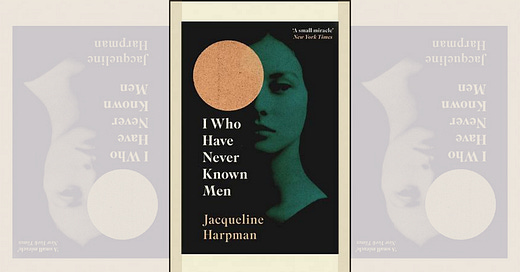The unusual thirty-year-old dystopian novel that's now a TikTok sensation
A reading of surprise TikTok bestseller I Who Have Never Known Men
If you keep up with TikTok book trends, you might know the beginning of this story already. A novel called I Who Will Never Know Men (Moi qui n’ai pas connu les hommes) by Belgian author Jaqueline Harpman was first published thirty years ago in French, (and two years later as The Mistress of Silence in the UK), and quickly faded into obscurity. It was then rediscovered in 2018 by a wily publisher at Vintage Classics, who decided its dystopian themes might meet the moment and repackaged it very successfully. Since then, it’s become a TikTok word-of-mouth sensation, steadily gathering sales and popular acclaim since 2022.
This book ticks my boxes on three fronts: I love looking at novels that explode in popularity at certain points in the zeitgeist, I spent years studying feminist dystopias, and I’m also fascinated by what my teen and her friends are reading because I really want the next generation to love literature despite the proliferation of tech (I’m happy to report that many of the kids I know are still enjoying novels). So when the sixteen-year-old daughter of a friend handed her copy to me during a conversation and told me to read it, because it’s like nothing else she’s ever read, I was immediately intrigued. Challenge accepted!
I Who Will Never Know Men is the story of thirty-nine women who live in a cage underground, guarded by men with whips who never talk to them, but who intervene if the women touch one another or do things like sleep or eat at the wrong time of day. No one can remember how they got there, although most of the women have some memories of the time before, when they had families of their own. In the cage, their routine has been unchanged for years, until one day an alarm goes off, the men run away, and the women, by a lucky twist of fate, manage to escape only to find themselves in the middle of nowhere … perhaps not even on earth.
The protagonist and narrator of this story remains nameless, but she is known by the other women as ‘the child’. She is much younger than the rest of them, and there’s some speculation that she is in the cage with them by accident. She has no memories of life before, and adapts to their circumstances in her own unique way. By the time the women escape she is a young adult, and they are all aware that she is likely to outlive the others by a stretch. As time goes on, the older women come to rely on her in different ways, particularly as they grow old and sick, until eventually she is left completely alone in the world.
It sounds horrific, doesn’t it? And I haven’t yet mentioned that there isn’t much plot. Instead, most of the story is pure observation around the circumstances the women and ‘the child’ find themselves in. In fact, there are many things about this novel that feel like, on paper, it shouldn’t work for readers – and yet its popularity proves that it does. Perhaps because there is a gentleness and acceptance in this story that is disconcerting – one might almost say comforting at times. Even the worst examples of death are described without much horror, as simply a fact of life. And the novelist doesn’t try to answer the reader’s fundamental questions – such as who these women are, where they are, what exactly has happened, who else is alive. Yet somehow this ceases to matter – in fact, it means there’s a tremendous amount of space left for the reader to colour in for themselves.
This novel also sets itself apart from many other dystopias in both length (it’s less than 180 pages) and because there isn’t much in the way of galvanising or warning commentary – aside from the situation itself. My only critique while reading it was around aspects of authenticity regarding the narrator’s well-developed language and sophisticated thought processes, considering she was brought to the cage as a child and has no formal education (only what the women offer her, which she says herself is varied). However, this feels like a quibble in the context of the narrative as a whole.
Harpman’s protagonist doesn’t suffer as much as we might expect, because she doesn’t know what has been lost, in terms of culture and civilisation. And yet she still finds her own values in the experience of living. At times she creates her own ritual and symbolism. Instead of offering hope or plot twists, this story is more about accepting and exploring life as it is – and about what it might mean to simply bear witness – made easier for the child because knowledge of ‘the time before’ is not a burden for her.
There is also little tension around what it means to be a woman, because male and female relationships hardly exist in this story. The child grows up curious about one of the younger guards, and is therefore aware of some level of sexuality, but once he disappears with the rest, she doesn’t develop those feelings much further. Some Tiktokkers have explicitly linked the book to the Korean 4B (Four Nos) feminist movement, whose proponents do not date men, marry men, have sex with men or have children with men. And yet, for a text that largely sidelines men, I’m curious that the title centralises them. I’d love to talk to the author about that!
Sadly, Harpman passed away in 2012 at the age of 82, and although there are some YouTube videos of her, I haven’t been able to find much where she talks about the novel. It’s known that her family fled Belgium after the Nazi regime invaded during the Second World War, when Harpman was just ten years old — a similar age to the child at the beginning of the story. A large number of her paternal family were killed at Auschwitz. Later in life, Harpman would return to Belgium and become a psychologist. She was a prolific writer, publishing many other stories.
I Who Have Never Known Men is now Harpman’s most famous novel - and while it might not have the pace of a thriller or a galvanising dystopian resistance, I’ll certainly remember it for its sheer originality of concept and the way it challenges storytelling conventions. Publishers often seem scared to take risks – cajoling authors to stay within genre tropes – but this story reminds us how exciting it can be when a writer tries something different. There’s a rawness and sparsity to the story that will surely jolt readers out of a slump, whether they love it or hate it. And the perspective of the child asks questions of our contemporary takes on life.
One of my favourite writers on Substack,
, often poses the question: What is left if we lose it all? This novel might not have all the answers, but it addresses the possibilities in a multitude of ways, and the results are fascinating. In addition, I’m a steadfast champion of authors valuing their backlist and continuing to promote their entire body of work, particularly when this runs counter to a culture obsessed by the next shiny new thing. I Who Will Never Know Men is a wonderful example of a hidden gem finding its way back into bookstores, and the novel is reaching a whole new generation of readers in ways you only wish Harpman could see.You can read more about Tiktokkers’ reactions to the book in this excellent article on The Cut: How ‘I Who Have Never Known Men’ Took Over BookTok
It’s my birthday today - my last one in my forties - so we’ll be going for a meal at my favourite spot by the beach, and I’ll try to take the day off from the computer! Next week I’ll be back with February’s author notes and some updates on my upcoming psychological suspense novel as well as my new substack for readers. My paid subscribers will also be getting an extra post, looking at some of the different opportunities to regenerate backlist titles.
Finally, our pet of the week this week is our darling Missy, who will turn nineteen in March - queen of the household and permanently grumpy because of all the other pets and the kid chaos we’ve inflicted on her over the years. She might only tolerate us, but we love her to bits.
Happy writing, and have a great week!






Ooh I LOVE a novel that feels like it shouldn't work but does! Not that I need to add anyting else to my TBR right now lol
Happy belated birthday! I hope you had a great meal out 😁🎈